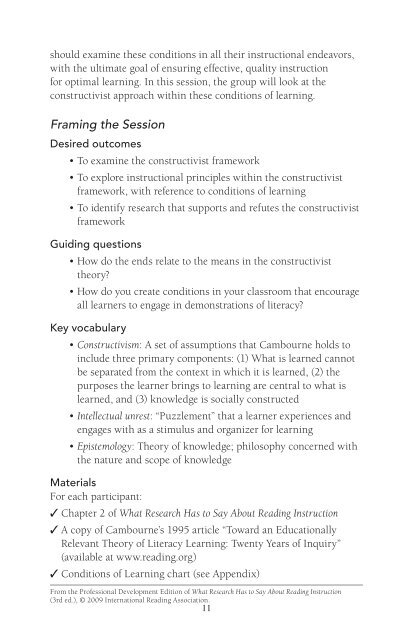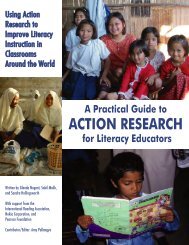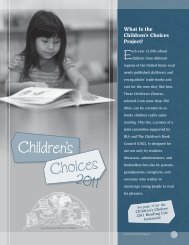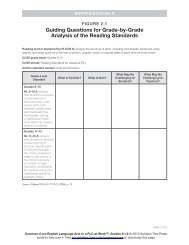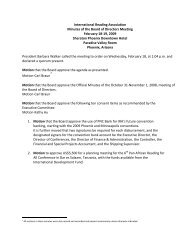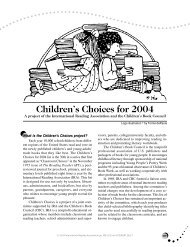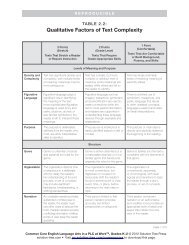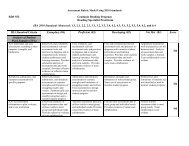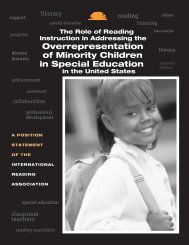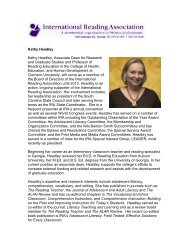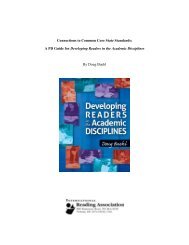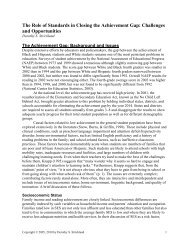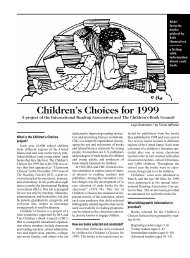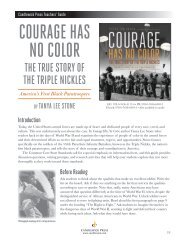What Research Has to Say About Reading Instruction - International ...
What Research Has to Say About Reading Instruction - International ...
What Research Has to Say About Reading Instruction - International ...
You also want an ePaper? Increase the reach of your titles
YUMPU automatically turns print PDFs into web optimized ePapers that Google loves.
should examine these conditions in all their instructional endeavors,<br />
with the ultimate goal of ensuring effective, quality instruction<br />
for optimal learning. In this session, the group will look at the<br />
constructivist approach within these conditions of learning.<br />
Framing the Session<br />
Desired outcomes<br />
• To examine the constructivist framework<br />
• To explore instructional principles within the constructivist<br />
framework, with reference <strong>to</strong> conditions of learning<br />
• To identify research that supports and refutes the constructivist<br />
framework<br />
Guiding questions<br />
• How do the ends relate <strong>to</strong> the means in the constructivist<br />
theory?<br />
• How do you create conditions in your classroom that encourage<br />
all learners <strong>to</strong> engage in demonstrations of literacy?<br />
Key vocabulary<br />
• Constructivism: A set of assumptions that Cambourne holds <strong>to</strong><br />
include three primary components: (1) <strong>What</strong> is learned cannot<br />
be separated from the context in which it is learned, (2) the<br />
purposes the learner brings <strong>to</strong> learning are central <strong>to</strong> what is<br />
learned, and (3) knowledge is socially constructed<br />
• Intellectual unrest: “Puzzlement” that a learner experiences and<br />
engages with as a stimulus and organizer for learning<br />
• Epistemology: Theory of knowledge; philosophy concerned with<br />
the nature and scope of knowledge<br />
Materials<br />
For each participant:<br />
✓ Chapter 2 of <strong>What</strong> <strong>Research</strong> <strong>Has</strong> <strong>to</strong> <strong>Say</strong> <strong>About</strong> <strong>Reading</strong> <strong>Instruction</strong><br />
✓ A copy of Cambourne’s 1995 article “Toward an Educationally<br />
Relevant Theory of Literacy Learning: Twenty Years of Inquiry”<br />
(available at www.reading.org)<br />
✓ Conditions of Learning chart (see Appendix)<br />
From the Professional Development Edition of <strong>What</strong> <strong>Research</strong> <strong>Has</strong> <strong>to</strong> <strong>Say</strong> <strong>About</strong> <strong>Reading</strong> <strong>Instruction</strong><br />
(3rd ed.), © 2009 <strong>International</strong> <strong>Reading</strong> Association.<br />
11


